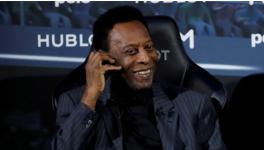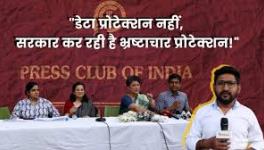Thousands Bid Tearful Farewell to Maradona in Argentina Amid Skirmishes
Buenos Aires: Tens of thousands of fans, many weeping, filed past the coffin of soccer superstar Diego Maradona in ceremonies that mixed head-of-state-like honours with the chaos of a rowdy stadium.
Viewing was halted shortly before 6 p.m. on Thursday as the family wished and the body of the Argentine icon was taken away for burial, frustrating many who were waiting to pay their respects and causing new tensions at the gates of the cemetery.
About two dozen people gathered at Jardín Bella Vista cemetery for a private religious ceremony and the burial. Maradona was being buried next to his parents, Dalma and Diego.
Fans singing soccer anthems, some draped in the national flag, formed a line that stretched more than 20 blocks from the Plaza de Mayo, where Argentines gathered to celebrate the Maradona-led triumph in the 1986 World Cup.
But with the time for viewing the coffin at the nation's presidential palace drawing short, police moved to cut off the back end of the crowd, enraging fans who hurled rocks and other objects at officers, who responded with rubber bullets.
The crowd overwhelmed organisers and the violence resulted in injuries and arrests, which led Maradona's family to end the public visitation. The casket was placed in a car that carried the former footballer's name on a paperboard by the window.
Desperate to say goodbye, Maradona's fans climbed on the fences of the presidential mansion as if they were in a soccer stadium, while firefighters worked to clear the ground.
"Diego is not dead, Diego lives in the people," people chanted as the coffin was taken to a cemetery outside Buenos Aires. The motorcade, accompanied by police, was followed on a local highway by dozens of honking cars and motorcycles.
Hundreds of fans blocked entry to the cemetery before the arrival of Maradona's casket, dancing and chanting as police moved in to open a way. The crowd continued making noise after the final ceremony began.
Maradona died on Wednesday of a heart attack in a house outside Buenos Aires where he had been recovering from a brain operation on November 3.
Fans wept and blew kisses as they passed the wooden coffin, some striking their chests with closed fists and shouting, "Let's go, Diego." It was draped with the Argentine flag and shirts bearing his famed No. 10 from the national team and the Boca Juniors club, with other jerseys tossed around it by passing admirers.
Open visitation began at 6:15 a.m. after a few hours of privacy for family and close friends. The first to bid farewell were his daughters and close family members.
His former wife, Claudia Villafañe, came with Maradona's daughters Dalma and Gianinna. Later came Verónica Ojeda, also an ex-wife, with their son, Dieguito Fernando.
Jana Maradona, who the player recognised as his daughter only a few years ago, also attended.
Then came former teammates of the 1986 World Cup-winning squad, including Oscar Ruggeri. Other Argentine footballers, such as Boca Juniors' Carlos Tévez, showed up, too.
Early in the morning some fans grew impatient as police tried to maintain order, and began throwing bottles and pieces of metal fencing at officers outside the presidential offices in the heart of Buenos Aires. Police at one point used tear gas to try to control them.
Interior Minister Wado de Pedro said he was upset over what he called the "craziness" of police actions against fans.
"This popular tribute cannot end in repression and running of those that came to say goodbye to Maradona," he said.
President Alberto Fernández appeared at midday and placed on the casket a jersey from the Argentinos Juniors team, where Maradona started his career in 1976.
In tears, Fernández also laid two handkerchiefs of the human rights organisation Mother of the Plaza de Mayo, who wore them for years to protest the disappearance of their children under Argentina's military dictatorship between 1976 and 1983.
Maradona, an outspoken Leftist who had an image of Argentine revolutionary Che Guevara tattooed on one bicep, was a friend of the Madres and other rights groups.
The lines started forming outside the Casa Rosada only hours after Maradona's death was confirmed and grew to several blocks.
A huge mural of Maradona's face was painted on the tiles that cover the Plaza de Mayo, near the Casa Rosada, which was decorated with a giant black ribbon at the entrance.
Maradona's soccer genius, personal struggles and plain-spoken personality resonated deeply with Argentines.
He led an underdog team to glory in the 1986 World Cup, winning the title after scoring two astonishing goals in a semifinal match against England, thrilling a country that felt humiliated by its loss against the British in the recent Falklands war and that was still recovering from the brutal military dictatorship.
Many of those in line to enter the Casa Rosada wore masks because of the COVID-19 pandemic, but they struggled to keep social distancing.
Social worker Rosa Noemí Monje, 63, said she and others overseeing health protocols understood the emotion of the moment.
"It is impossible to ask them to distance. We behave respectfully and offer them sanitiser and face masks," she said. Monje also paid her last tribute to Maradona.
"I told him: to victory always, Diego," Monje said as she wept.
Get the latest reports & analysis with people's perspective on Protests, movements & deep analytical videos, discussions of the current affairs in your Telegram app. Subscribe to NewsClick's Telegram channel & get Real-Time updates on stories, as they get published on our website.















